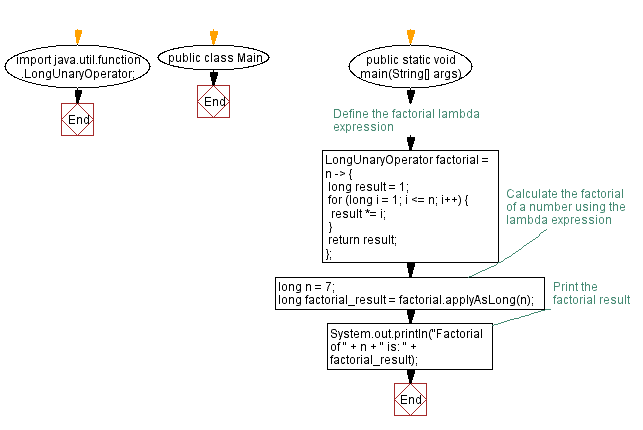Calculate factorial using Lambda expression in Java
8. Calculate factorial using lambda expression
Write a lambda expression to implement a lambda expression to calculate the factorial of a given number.
Sample Solution:
Java Code:
import java.util.function.LongUnaryOperator;
public class Main {
public static void main(String[] args) {
// Define the factorial lambda expression
LongUnaryOperator factorial = n -> {
long result = 1;
for (long i = 1; i <= n; i++) {
result *= i;
}
return result;
};
// Calculate the factorial of a number using the lambda expression
long n = 7;
long factorial_result = factorial.applyAsLong(n);
// Print the factorial result
System.out.println("Factorial of " + n + " is: " + factorial_result);
}
}
Sample Output:
Factorial of 7 is: 5040
Explanation:
In the above exercise, we define a lambda expression using the LongUnaryOperator functional interface. This interface represents an operation on a single long operand and produces a long result.
In the main method, we create an instance of the LongUnaryOperator using the lambda expression. Then, we specify the number for which the factorial should be calculated.
In order to calculate the factorial, we use the applyAsLong method of the lambda expression and pass the number as an argument. In the factorialResult variable, we store the result.
Lastly, we print the factorial result using System.out.println ().
Flowchart:

For more Practice: Solve these Related Problems:
- Write a Java program to implement a lambda expression that calculates factorial iteratively using the reduce() method.
- Write a Java program to create a lambda that computes factorials for a list of numbers and collects the results in a map.
- Write a Java program to implement a recursive lambda for factorial calculation using a functional interface and memoization.
- Write a Java program to chain lambda expressions that compute factorial and then format the output with proper alignment.
Go to:
PREV : Remove integer duplicates using lambda.
NEXT : Check if number is prime using lambda.
Live Demo:
Java Code Editor:
Improve this sample solution and post your code through Disqus
What is the difficulty level of this exercise?
Test your Programming skills with w3resource's quiz.
